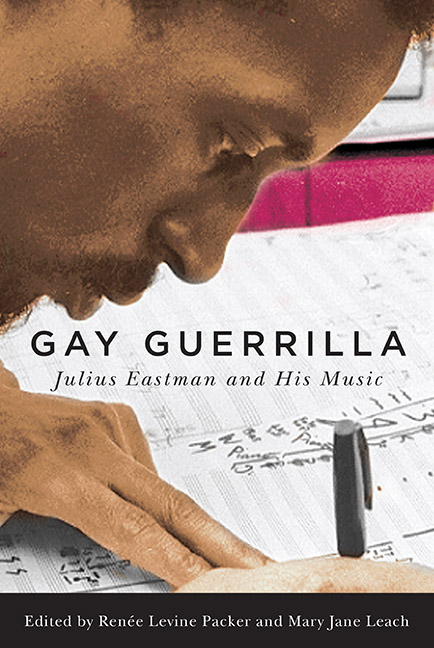Book contents
- Frontmatter
- Contents
- Foreword
- Acknowledgments
- Introduction: Julius Eastman and His Music
- 1 Julius Eastman, A Biography
- 2 Unjust Malaise
- 3 The Julius Eastman Parables
- 4 Julius Eastman and the Conception of “Organic Music”
- 5 Julius Eastman Singing
- 6 An Accidental Musicologist Passes the Torch
- 7 A Flexible Musical Identity: Julius Eastman in New York City, 1976–90
- 8 Evil Nigger: A Piece for Multiple Instruments of the Same Type by Julius Eastman (1979), with Performance Instructions by Joseph Kubera
- 9 A Postminimalist Analysis of Julius Eastman’s Crazy Nigger
- 10 “That Piece Does Not Exist without Julius”: Still Staying on Stay On It
- 11 Connecting the Dots
- 12 Gay Guerrilla: A Minimalist Choralphantasie
- Appendix: Julius Eastman Compositions
- Chronology
- Selected Bibliography
- List of Contributors
- Index
- Eastman Studies in Music
9 - A Postminimalist Analysis of Julius Eastman’s Crazy Nigger
Published online by Cambridge University Press: 26 May 2021
- Frontmatter
- Contents
- Foreword
- Acknowledgments
- Introduction: Julius Eastman and His Music
- 1 Julius Eastman, A Biography
- 2 Unjust Malaise
- 3 The Julius Eastman Parables
- 4 Julius Eastman and the Conception of “Organic Music”
- 5 Julius Eastman Singing
- 6 An Accidental Musicologist Passes the Torch
- 7 A Flexible Musical Identity: Julius Eastman in New York City, 1976–90
- 8 Evil Nigger: A Piece for Multiple Instruments of the Same Type by Julius Eastman (1979), with Performance Instructions by Joseph Kubera
- 9 A Postminimalist Analysis of Julius Eastman’s Crazy Nigger
- 10 “That Piece Does Not Exist without Julius”: Still Staying on Stay On It
- 11 Connecting the Dots
- 12 Gay Guerrilla: A Minimalist Choralphantasie
- Appendix: Julius Eastman Compositions
- Chronology
- Selected Bibliography
- List of Contributors
- Index
- Eastman Studies in Music
Summary
No one can deny that Julius Eastman had a unique voice, both literally and compositionally. Figures such as Kyle Gann, Mary Jane Leach, and Diamanda Galas have all singled out Eastman's music as being inimitable and unforgettable. However, until recently there has been little study of what distinguishes his voice. At first glance, an openly gay African-American composer, championed by the likes of Morton Feldman and Lukas Foss, would provide ample avenues to explore his work both analytically and hermeneutically. But his erratic career, the dispersion of his scores, and the cryptic nature of those scores that have been found, make the performance or even cursory knowledge of his works, much less intensive analysis, tremendously difficult. The work of Leach, Joseph Kubera, and Cees van Zeeland constitute a concentration of materials concerning Eastman's late 1970s work Crazy Nigger. Several of the techniques Eastman used in this work are salient to the listener, such as his bracing dissonance and the obscuring of minimalism's omnipresent pulse. Through analysis, the origins of these qualities reveal themselves to be extended tonalities more akin to Stravinsky and Bartok than the French symbolists, ragas, and modal jazz that informed earlier minimalists, as well as a larger overall additive process Eastman called “organic music.”
My analysis is based on three sources. The first is a facsimile of an autograph score from Mary Jane Leach's online compilation of Eastman's scores. The second is a live recording available on the New World Records CD set Unjust Malaise. This recording dates from a concert given at Northwestern University as part of his residency there in January 1980, which featured Eastman as one of four pianists performing Crazy Nigger, along with two identically scored works: Evil Nigger and Gay Guerrilla. Like many contemporary minimalist composers, Eastman's scores were never intended for transmission as much as they were mnemonic reminders for his own performances. Thus, either a recording or the memories of performers are vital for the resolution from the score into sounding music.
- Type
- Chapter
- Information
- Gay GuerrillaJulius Eastman and His Music, pp. 140 - 150Publisher: Boydell & BrewerPrint publication year: 2015



